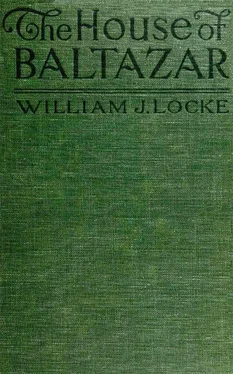At the young man’s tribute she flushed slightly and smiled. But the smile died away when he added:
“What was he like? I’ve often wondered, and there has been no one to tell me—no one I could have listened to. The dons of his generation are too shy to refer to him and I’m too shy to ask ’em. Do you know, I’ve never seen a picture of him even.”
“He was not unlike you,” she replied, looking not at him, but wistfully down the years. “Of heavier build. He was a man of tremendous vitality—and swift brain. The most marvellous teacher I have ever met. He seemed to hold your intellect in his hands like a physical thing, sweep it clear of cobwebs and compel it to assimilate whatever he chose. A born teacher and a wonderful man.”
“But was he human? I know his work, though I haven’t read enough to tackle it yet—most of it’s away and beyond Part II of the Tripos even. I went up with an Open Mathematical Scholarship just before the war, and only did my first year’s reading. I’m beginning this”—he tapped his Treatise on Rigid Dynamics—“on my own. What I mean is,” he went on, after a pause, “my father has been always an abstraction to me. I shouldn’t have worried about him if he had just been a nonentity—it wasn’t playing the game to vanish as he did into space and leave my mother to fend for herself.”
“But I heard,” said the Sister, “that your mother had her own private fortune.”
“I wasn’t alluding to that side of it,” he admitted. “But he did vanish, didn’t he? Well, as I say, if he had been just a nobody, I shouldn’t have been particularly interested; but he wasn’t. He was the most brilliant man of his generation at Cambridge. For instance, he took up Chinese as a sort of relaxation. They say his is the only really scientific handbook on the study of the language. You see, Sister”—he swerved impatiently on his chair and brought his hand down on the table, whereat she drew a swift inward breath, for the gesture of the son was that of the father—“I’ve always wanted to know whether I’m the son of an inhuman intellect or of a man of flesh and blood. Was he human? That’s what I want to know.”
“He was human all right,” she replied quietly. “Too human. Of course he was essentially the scholar—or savant—whatever you like to call it. His work was always to him an intellectual orgy. But he loved the world too. He was a fascinating companion. He seemed to want to get everything possible out of life.”
“Why didn’t he get it?”
“He was a man,” she said, “of sensitive honour.”
Captain Baltazar threw away the flaming match wherewith he was about to light a cigarette.
“That licks me,” said he.
“How?”
“His bolting. Did you know my father very well?”
“I’ve told you we were great friends.”
“Did you know my mother?”
Her eyelids flickered for a moment; but she replied steadily:
“No. I was only a student and your father was my private tutor. But I heard—from other people—a great deal about your mother. I believe she died many years ago, didn’t she?”
“Yes. When I was five. I barely remember her. I was brought up by my uncle and aunt—her people. They scarcely knew my father and haven’t a good word to say about him. It was only when I grew up and developed a sort of taste for mathematics, that I realized what a swell he was. And I can’t help being fascinated by the mystery of it. There he was, as far as I can gather, full of money, his own (which he walked off with) and of mother’s, beginning to enjoy at thirty a world-wide reputation—and suddenly he disappears off the face of the earth. It wasn’t a question of suicide. For the man who buys a ticket for the next world doesn’t go to peculiar trouble to take all his worldly estate with him. It isn’t reasonable, is it?”
“Your father was too much in love with life to go out of it voluntarily,” said Sister Baring.
“Then what the blazes did he do, and why did he do it?”
“I don’t know,” she said.
“Is he alive or dead?”
“How should I know, Mr. Baltazar?”
“He never wrote to you—after——?”
“Why should he have written to me?” she interrupted.
The rebuke in her voice and eyes sent the young man into confused apologies.
“Naturally not. You must forgive me, Sister; but, as I’ve told you, I’ve never met a pal of that mysterious father of mine before. I want to get all the information I can.”
She drew a chair and sat by him. The great hall was very still and, in contrast with the vivid sunshine perceived through the eastern windows, very dark. Through the open door came the scents of the summer gardens. The air was a little heavy. She felt her cap hot around her temples, and lassitude enfeebling her limbs. The strain of the war years began to tell. She had regarded this appointment as a rest from the intolerable toil of the General Hospital in a large town which she had just quitted. Before then she had served in France. And before that—for many years—she had followed the selfless career of the nurse. Now, suddenly, her splendid nerve showed signs of giving. If she had not sat down, her legs would have crumpled up beneath her. So she thought. . . .
She looked at the young man, so eager, so proven, so like his father in gesture and glance, yet in speech and outlook—she was yet to get to that—but she knew the revolutionary influences of the war, the real war, on those who have faced its terrors and become saturated with its abiding philosophies—so different from the fervid creature, John Baltazar, of the late nineties, who had never dreamed of the possibility of this world convulsion. He had much the same frank charm of manner, the direct simplicity of utterance; but the mouth was weaker; the eyes were blue, the eyes of a shrewish blonde—not the compelling, laughing, steel-grey eyes with a queer sparkle in the iris of John Baltazar. All in the young face that was not John Baltazar’s was the mother’s. She hated the mother dead, as she had loathed her living. Only once had she seen her, a blonde shrew-mouse of a woman. Just a passing by on the Newnham road, when a companion had pointed her out as Mrs. Baltazar. The little bitter mouth had bitten into her memory: the hard little blue eyes had haunted her for eighteen years. The mouth and eyes were there, before her, now. The rest, all that was noble in the boy, was John Baltazar.
“Who has told you the little you do know about him?” she asked.
“My uncle. My mother’s brother. I don’t think I have any relations living on my father’s side. At any rate, I’ve not heard of them. We’re of old Huguenot stock—Revocation of Edict of Nantes refugees—God knows what we were before. Long ago I happened upon a copy somewhere of the Annuaire Militaire de l’Armée Française—and I found a Baltazar in the list. I had an idea of writing him; but I didn’t, of course. Now I suppose the poor devil’s killed. Anyhow, that’s nothing to do with your question. My uncle—Sir Richard Woodcott—they knighted him for manufacturing easily broken hardware round about Birmingham, or for going to chapel, or something—you know the type——”
Again she rebuked him: “I thought you said your uncle brought you up.”
“On my mother’s fortune—he was my guardian and trustee. But he never let me forget that I was the son of John Baltazar. There was no question of affection from either of them—himself or his wife. Anything I did wrong—it was my scoundrel of a father coming out in me. After passing through a childish phase of looking on him as a kind of devil who had blasted my young life, I began to have a sneaking regard for him. You see, don’t you? If he was the antithesis of Uncle Richard, he must be somebody I could sympathize with, perhaps rather somebody who could sympathize with me. They drew me into the arms of his memory, so to speak. Odd, isn’t it?”
Читать дальше












